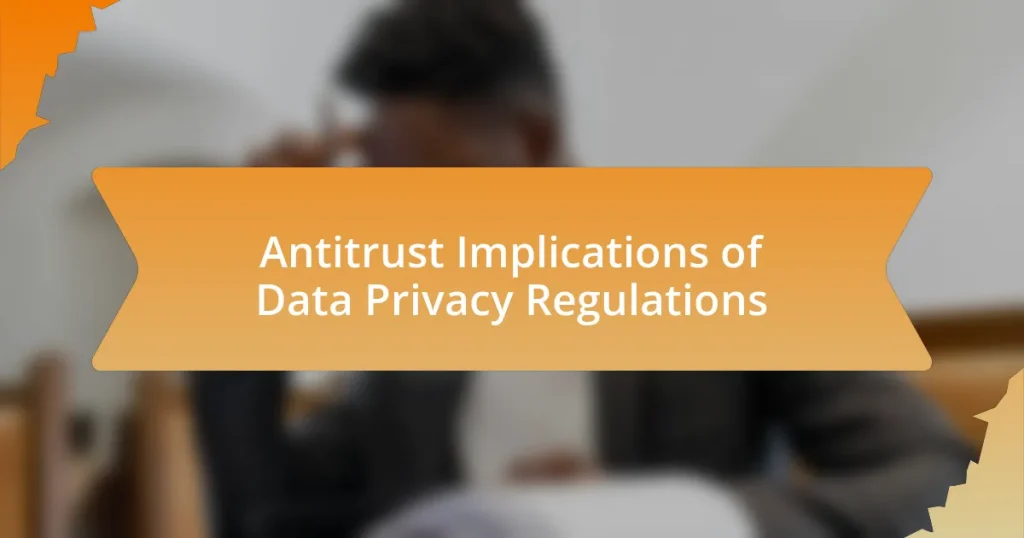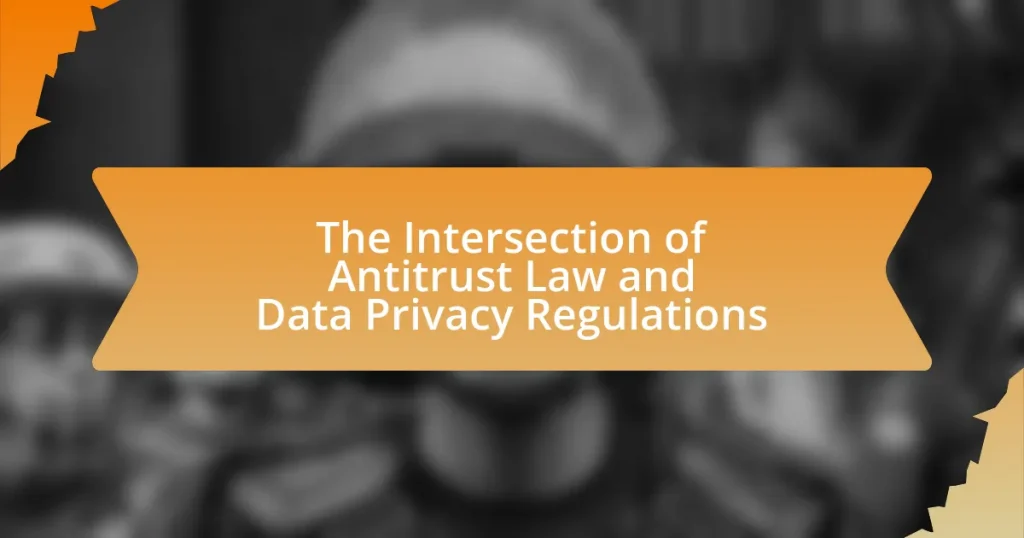The article examines the antitrust implications of data privacy regulations, highlighting how these regulations can impact competition among businesses. It discusses the intersection of data privacy laws, such as the General Data Protection Regulation (GDPR) and the California Consumer Privacy Act (CCPA), with antitrust laws, emphasizing the challenges smaller firms face in compliance and the potential for market consolidation among larger companies. Key issues include the risks of violating both data privacy and antitrust laws, the influence of enforcement agencies, and the evolving regulatory landscape that companies must navigate to align their practices with both sets of regulations. The article also outlines best practices for compliance and the importance of understanding the implications of data control on market dynamics.
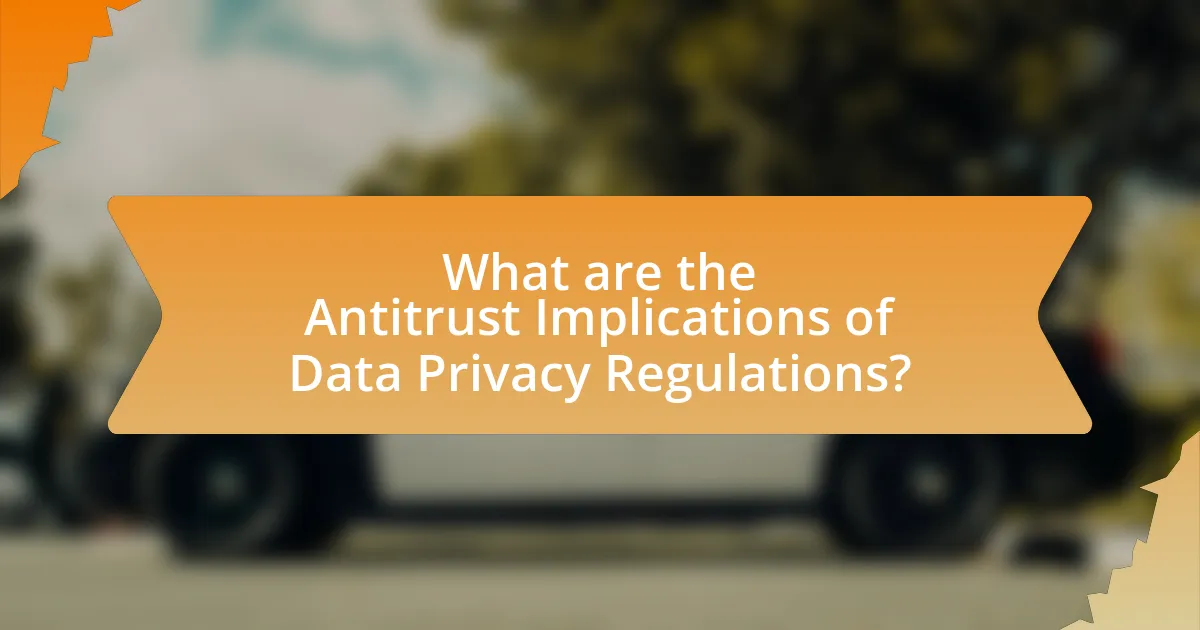
What are the Antitrust Implications of Data Privacy Regulations?
Data privacy regulations can have significant antitrust implications by potentially limiting competition among businesses. These regulations often require companies to implement stringent data protection measures, which can disproportionately affect smaller firms that lack the resources to comply, thereby reducing market entry and competition. For instance, the General Data Protection Regulation (GDPR) in the European Union imposes heavy fines for non-compliance, which can deter new entrants and consolidate market power among larger firms that can absorb these costs. Additionally, data privacy regulations may lead to increased barriers to data sharing and collaboration, further entrenching the dominance of established players in the market.
How do data privacy regulations intersect with antitrust laws?
Data privacy regulations intersect with antitrust laws primarily through the control of data as a competitive asset. Companies that dominate data collection can leverage this advantage to stifle competition, leading to potential antitrust violations. For instance, the European Union’s General Data Protection Regulation (GDPR) emphasizes consumer rights over personal data, which can impact how companies use data to maintain market power. This intersection is evident in cases where data practices are scrutinized not only for privacy violations but also for their implications on market competition, as seen in investigations of major tech firms by regulatory bodies like the Federal Trade Commission (FTC) in the United States.
What are the key data privacy regulations affecting antitrust considerations?
Key data privacy regulations affecting antitrust considerations include the General Data Protection Regulation (GDPR) in the European Union and the California Consumer Privacy Act (CCPA) in the United States. The GDPR imposes strict rules on data handling and processing, which can influence market competition by limiting how companies collect and use consumer data. The CCPA grants consumers rights regarding their personal information, impacting how businesses operate and compete in the marketplace. Both regulations create a framework that can affect mergers and acquisitions, as companies must consider compliance costs and potential legal liabilities when assessing competitive practices.
How do these regulations impact market competition?
Data privacy regulations can significantly impact market competition by imposing compliance costs and barriers to entry for smaller firms. These regulations often require substantial investments in data protection measures, which can disproportionately affect startups and smaller companies that lack the resources of larger corporations. For instance, the General Data Protection Regulation (GDPR) in the European Union has led to increased operational costs for businesses, with estimates suggesting compliance costs can reach millions for larger firms and be prohibitive for smaller entities. Consequently, this can lead to reduced competition as smaller players may exit the market or be unable to compete effectively, ultimately consolidating market power among larger firms that can absorb these costs.
Why are antitrust implications important in the context of data privacy?
Antitrust implications are important in the context of data privacy because they address the competitive landscape in which companies operate, particularly regarding data collection and usage practices. When large firms dominate the market, they can exploit consumer data without adequate privacy protections, leading to anti-competitive behavior that harms both consumers and smaller competitors. For instance, the European Union’s General Data Protection Regulation (GDPR) emphasizes the need for fair competition alongside data protection, highlighting that monopolistic practices can undermine consumer trust and privacy rights. This intersection of antitrust and data privacy ensures that regulations promote not only the protection of personal information but also a competitive market that fosters innovation and consumer choice.
What risks do companies face if they violate both data privacy and antitrust laws?
Companies face significant legal and financial risks if they violate both data privacy and antitrust laws, including hefty fines, litigation costs, and reputational damage. For instance, the Federal Trade Commission (FTC) can impose fines that reach billions of dollars for violations of data privacy regulations, while antitrust violations can lead to additional penalties and restrictions on business practices. In 2020, the European Union fined Google €4.34 billion for antitrust violations, which illustrates the severe financial consequences of non-compliance. Furthermore, companies may face class-action lawsuits from consumers whose data privacy has been compromised, leading to further financial liabilities and loss of consumer trust. This dual violation can also result in increased regulatory scrutiny and operational restrictions, hampering a company’s ability to compete effectively in the market.
How can antitrust implications influence consumer trust and market dynamics?
Antitrust implications can significantly influence consumer trust and market dynamics by promoting competition and preventing monopolistic practices. When antitrust laws are enforced, they ensure that no single entity can dominate the market, which fosters a diverse range of choices for consumers. This diversity enhances consumer trust, as individuals feel empowered to select from various options rather than being forced into a limited selection dictated by a monopolistic player.
For instance, the enforcement of antitrust regulations against major tech companies has led to increased scrutiny of their data privacy practices, which directly impacts consumer perceptions. A study by the Federal Trade Commission in 2020 highlighted that consumers are more likely to trust companies that operate in competitive markets, as these companies are perceived to be more accountable and responsive to consumer needs. Consequently, effective antitrust enforcement can lead to healthier market dynamics, where innovation thrives, and consumer interests are prioritized, ultimately reinforcing trust in the marketplace.
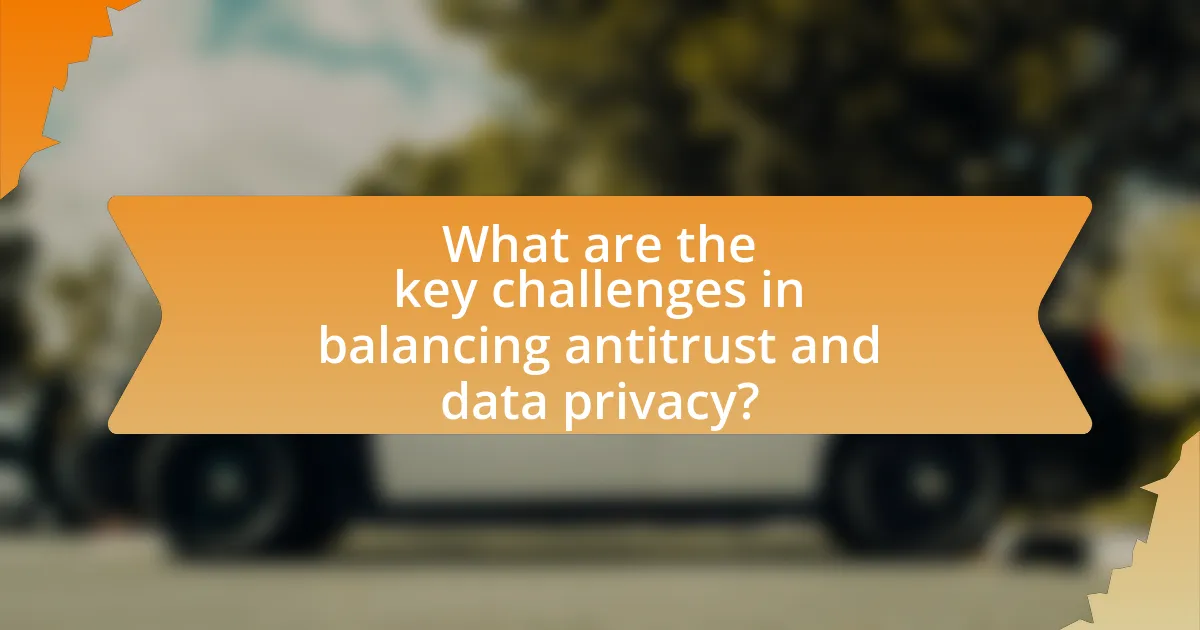
What are the key challenges in balancing antitrust and data privacy?
The key challenges in balancing antitrust and data privacy include the conflict between promoting competition and protecting consumer data. Antitrust laws aim to prevent monopolistic practices and encourage market competition, while data privacy regulations focus on safeguarding personal information. For instance, aggressive competition may lead companies to collect and utilize vast amounts of consumer data, potentially infringing on privacy rights. Conversely, stringent data privacy regulations can limit the ability of companies to innovate and compete effectively, as seen in the European Union’s General Data Protection Regulation (GDPR), which imposes strict data handling requirements that can hinder market entry for smaller firms. This tension creates a complex regulatory environment where policymakers must navigate the dual objectives of fostering competition and ensuring consumer privacy.
What conflicts arise between data privacy regulations and antitrust enforcement?
Conflicts between data privacy regulations and antitrust enforcement primarily arise from the differing objectives of these frameworks. Data privacy regulations, such as the General Data Protection Regulation (GDPR), prioritize individual privacy rights and restrict data collection and processing, while antitrust enforcement aims to promote competition and prevent monopolistic practices. For instance, stringent data privacy laws can limit the ability of companies to share data, which may hinder market entry for new competitors or reduce the competitive dynamics in an industry. This tension is evident in cases where compliance with privacy regulations can lead to reduced data availability, impacting antitrust assessments that rely on data-driven analysis of market behavior. Additionally, companies may face challenges in balancing compliance with both sets of regulations, leading to potential legal conflicts and uncertainties in enforcement actions.
How do different jurisdictions approach these conflicts?
Different jurisdictions approach conflicts between antitrust implications and data privacy regulations through varying legal frameworks and enforcement strategies. For instance, the European Union employs a stringent regulatory approach, exemplified by the General Data Protection Regulation (GDPR), which prioritizes consumer privacy and imposes heavy fines for non-compliance, while also considering antitrust implications in cases like Google and Facebook. In contrast, the United States adopts a more fragmented approach, where federal and state laws coexist, leading to less uniformity; for example, California’s Consumer Privacy Act (CCPA) emphasizes consumer rights but does not directly address antitrust concerns. This divergence illustrates how jurisdictions balance the protection of consumer data with the promotion of competition, reflecting their unique legal traditions and policy priorities.
What role do enforcement agencies play in resolving these issues?
Enforcement agencies play a critical role in resolving antitrust issues related to data privacy regulations by investigating and prosecuting anti-competitive practices. These agencies, such as the Federal Trade Commission (FTC) in the United States, ensure compliance with laws designed to promote fair competition and protect consumer privacy. For instance, the FTC has taken action against companies that misuse consumer data or engage in deceptive practices that stifle competition, thereby reinforcing the importance of both data privacy and market fairness. This dual focus helps maintain a balance between protecting consumer rights and fostering a competitive marketplace, which is essential for innovation and economic growth.
How can companies navigate the complexities of antitrust and data privacy?
Companies can navigate the complexities of antitrust and data privacy by implementing robust compliance frameworks that align with both regulatory requirements. This involves conducting thorough assessments of data practices to ensure they do not violate antitrust laws while also adhering to data privacy regulations such as the General Data Protection Regulation (GDPR) and the California Consumer Privacy Act (CCPA).
For instance, companies should regularly audit their data collection and sharing practices to identify potential conflicts between competitive strategies and privacy obligations. Additionally, engaging legal experts in both antitrust and data privacy can help organizations develop policies that mitigate risks associated with non-compliance.
Research indicates that companies that proactively address these issues can reduce the likelihood of legal challenges; for example, a study by the European Commission found that firms with comprehensive compliance programs experienced fewer antitrust investigations.
What best practices should companies adopt to comply with both sets of regulations?
Companies should adopt a comprehensive compliance strategy that integrates both antitrust and data privacy regulations. This involves conducting regular audits to assess compliance with both sets of regulations, ensuring transparency in data collection and usage practices, and implementing robust data protection measures. For instance, the General Data Protection Regulation (GDPR) mandates explicit consent for data processing, while antitrust laws require fair competition practices; thus, companies must ensure that their data practices do not unfairly disadvantage competitors. Additionally, training employees on both regulatory frameworks can enhance compliance and reduce the risk of violations. According to a report by the International Association of Privacy Professionals, organizations that proactively manage compliance can mitigate legal risks and enhance consumer trust, demonstrating the effectiveness of these best practices.
How can companies assess their risk exposure in this area?
Companies can assess their risk exposure in antitrust implications of data privacy regulations by conducting comprehensive audits of their data practices and compliance with relevant laws. This involves evaluating data collection methods, storage practices, and sharing protocols to ensure alignment with regulations such as the General Data Protection Regulation (GDPR) and the California Consumer Privacy Act (CCPA). Additionally, companies should analyze past enforcement actions and legal precedents to understand potential liabilities. For instance, the European Commission has imposed significant fines on companies for non-compliance, highlighting the financial risks associated with inadequate data privacy measures. By systematically reviewing these factors, companies can identify vulnerabilities and implement strategies to mitigate risks effectively.
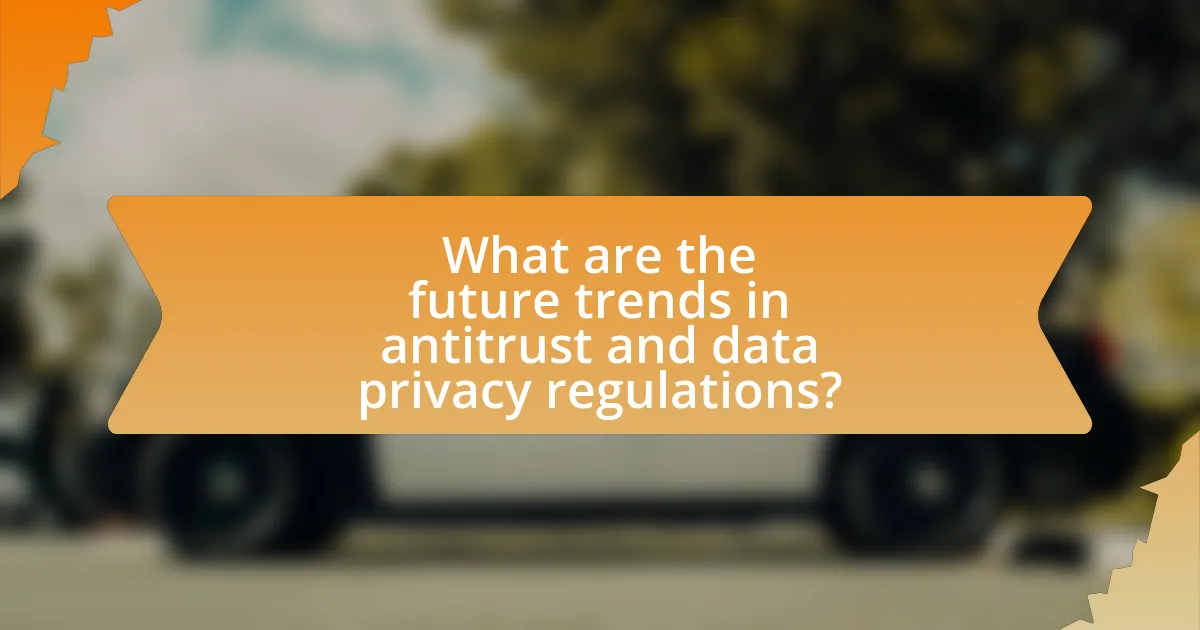
What are the future trends in antitrust and data privacy regulations?
Future trends in antitrust and data privacy regulations indicate a growing emphasis on the intersection of competition law and consumer data protection. Regulatory bodies are increasingly scrutinizing how data practices of large tech companies may stifle competition, leading to potential antitrust actions. For instance, the European Union’s Digital Markets Act aims to ensure fair competition by imposing strict rules on major digital platforms regarding data usage and interoperability. Additionally, the rise of privacy laws, such as the California Consumer Privacy Act, reflects a trend towards enhancing consumer rights over personal data, which may influence antitrust assessments by considering data control as a competitive factor. These developments suggest that future regulations will likely integrate data privacy considerations into antitrust frameworks, promoting both competition and consumer protection.
How might evolving data privacy laws affect antitrust enforcement in the future?
Evolving data privacy laws may lead to stricter antitrust enforcement by increasing scrutiny on how companies collect and use consumer data. As regulations like the General Data Protection Regulation (GDPR) and California Consumer Privacy Act (CCPA) establish clearer guidelines for data handling, antitrust authorities may leverage these frameworks to assess whether data practices create unfair competitive advantages. For instance, companies that misuse consumer data could face not only privacy penalties but also antitrust actions if their practices harm competition. This dual enforcement approach reflects a growing recognition that data control is integral to market power, thereby reshaping the landscape of antitrust investigations and actions in the future.
What potential changes in legislation should companies be aware of?
Companies should be aware of potential changes in data privacy legislation that could impact antitrust regulations. Recent trends indicate that governments are increasingly focusing on the intersection of data privacy and competition law, with proposed regulations aiming to enhance consumer protection and limit monopolistic practices. For instance, the European Union’s Digital Markets Act introduces stricter rules for large tech companies regarding data usage and sharing, which could affect their competitive strategies. Additionally, the Federal Trade Commission in the United States is considering new guidelines that may impose stricter scrutiny on how companies collect and utilize consumer data, potentially leading to increased compliance costs and legal challenges. These legislative shifts underscore the need for companies to adapt their data management practices to align with evolving legal frameworks.
How can companies prepare for future regulatory developments?
Companies can prepare for future regulatory developments by establishing a proactive compliance framework that includes continuous monitoring of regulatory changes and engaging in regular risk assessments. This approach allows companies to identify potential regulatory shifts early and adapt their policies accordingly. For instance, the General Data Protection Regulation (GDPR) in Europe has set a precedent for data privacy laws globally, prompting companies to enhance their data governance practices to avoid penalties. By investing in legal expertise and compliance technology, companies can ensure they remain informed about evolving regulations and can implement necessary changes swiftly, thereby mitigating risks associated with non-compliance.
What practical steps can businesses take to align data privacy and antitrust compliance?
Businesses can align data privacy and antitrust compliance by implementing a comprehensive compliance framework that integrates both areas. This involves conducting regular audits to assess data handling practices against privacy regulations, such as the General Data Protection Regulation (GDPR), while also evaluating competitive practices to ensure they do not violate antitrust laws.
Additionally, businesses should establish clear data governance policies that define how data is collected, stored, and shared, ensuring transparency and accountability. Training employees on both data privacy and antitrust regulations is crucial, as it fosters a culture of compliance and awareness.
Furthermore, engaging with legal experts who specialize in both fields can provide insights into navigating the complexities of compliance. According to a report by the International Association of Privacy Professionals (IAPP), organizations that adopt integrated compliance strategies are better positioned to mitigate risks associated with regulatory violations.
How can companies implement effective compliance programs?
Companies can implement effective compliance programs by establishing clear policies, conducting regular training, and ensuring ongoing monitoring and assessment. Clear policies provide a framework for expected behaviors and legal requirements, while regular training ensures that employees understand these policies and their implications, particularly in relation to data privacy regulations. Ongoing monitoring and assessment allow companies to identify potential compliance gaps and address them proactively, which is crucial given the evolving nature of data privacy laws and antitrust implications. For instance, a study by the Ponemon Institute found that organizations with comprehensive compliance training programs experience 50% fewer incidents of non-compliance, highlighting the effectiveness of structured training in fostering a culture of compliance.
What resources are available for businesses seeking guidance in this area?
Businesses seeking guidance on the antitrust implications of data privacy regulations can access several key resources. The Federal Trade Commission (FTC) provides guidelines and reports that outline the intersection of antitrust law and data privacy, helping businesses understand compliance requirements. Additionally, the European Commission offers comprehensive resources, including regulations and guidelines on data protection and competition law, particularly relevant for companies operating in the EU. Industry associations, such as the International Association of Privacy Professionals (IAPP), also provide training, webinars, and publications focused on navigating these complex legal landscapes. These resources are essential for businesses to ensure they remain compliant while understanding the competitive implications of data privacy regulations.
